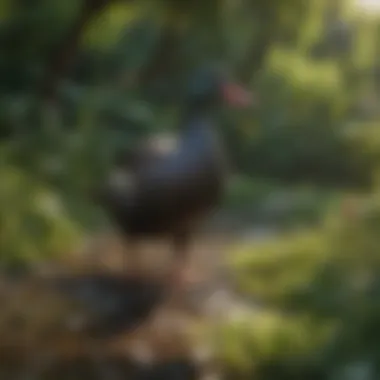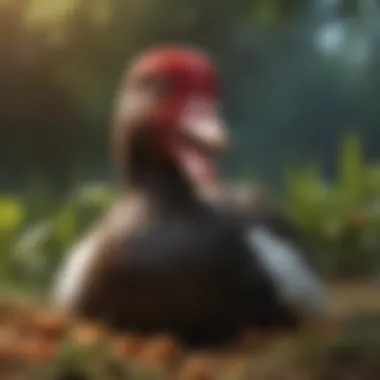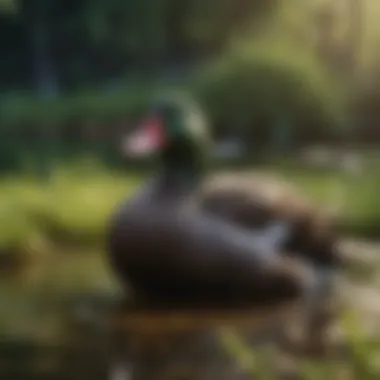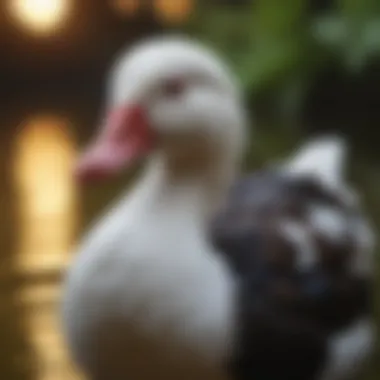Muscovy Ducks: Essential Dietary Guide for Owners


Intro
Understanding the nutritional needs of Muscovy ducks goes beyond just feeding them scraps from the kitchen. These unique birds have specific dietary requirements that directly influence their health, growth, and reproductive success. Pet owners who want to rear Muscovy ducks must dive into the intricacies of their diets, recognizing the right balance between natural foraging and commercial feeds.
Muscovy ducks are robust and adaptable creatures, often renowned for their hardiness in various environments. Their diet should mirror this adaptability, catering to their natural instincts while ensuring they receive essential nutrients. This guide tackles the essential components of their nourishment – detailing what they can forage for, what's best in commercial feeds, and any additional supplements that might be beneficial. By paying heed to these dietary requirements, owners can foster optimal health and vitality in their ducks, paving the way for a lively and productive life.
To connect the dots between everyday feeding practices and the ducks’ overall well-being, we will explore significant points, potential challenges, and common misconceptions. Let's embark on this journey to understand the best dietary practices for Muscovy ducks.
Understanding Muscovy Ducks
To grasp the dietary needs of Muscovy ducks, it's crucial to understand who they are beyond the surface. Muscovy ducks (Cairina moschata) are not just any ordinary ducks. They sport a unique look with their distinctive red facial caruncles that set them apart from other breeds. This fascinating characteristic beckons their keepers to learn more about their nutritional requirements, as it’s not merely about what to feed them, but rather how to fuel their robust, dynamic nature. Understanding Muscovy ducks encourages pet owners to take informed measures that cater to their specific health needs, ultimately impacting their overall well-being.
Origin and Characteristics
Muscovy ducks hail from Central and South America, where they are known for their hardy constitution and adaptability. Their wild ancestors thrived in various terrains, from wetlands to forests, showcasing a diversity that influences their current dietary preferences. With a distinctive body shape, adult Muscovy ducks can weigh between six to ten pounds, and their color range is extensive, including black, white, and chocolate variations.
Their origins play a pivotal role in their foraging behavior; these ducks are natural foragers, relying on a mix of plant matter, insects, and small aquatic creatures. Understanding this origin can help owners replicate their natural diet more effectively. Ample space to roam, access to water sources, and opportunities to forage can significantly improve their quality of life.
Behavioral Traits
When it comes to behavior, Muscovy ducks exhibit a blend of mannerisms that make them uniquely engaging. They possess a mild temperament, are generally quieter compared to other duck breeds, which can be a boon for urban gardens. Observing these traits not only enhances the bond between the duck and its owner but also allows for a better understanding of how certain dietary choices can influence their mood and activity.
Additionally, social creatures by nature, Muscovy ducks thrive in groups. They communicate with coos and displays of camaraderie, which may change based on food availability or social dynamics within their flock. Recognizing these behavioral nuances aids in crafting a feeding strategy that aligns with their social structures, ensuring they are nourished without causing stress or competition among them.
By pursuing knowledge of their origins and behavioral traits, pet enthusiasts ensure they offer the most beneficial dietary choices possible. This understanding skills the way for a healthy, stimulating environment that promotes proper growth, reproductive success, and a thriving life.
Primary Food Sources
Understanding the primary food sources for Muscovy ducks is crucial for their health and well-being. These ducks have unique dietary preferences and requirements, which significantly influence their growth, reproduction, and overall vitality. By recognizing where their nutrition comes from, pet owners can make informed choices about what to feed their ducks. Two main components of their diet emerge: the natural foraging they engage in and the commercial feed options available to them.
Natural Foraging Diet
Muscovy ducks are natural foragers, which means they thrive on a diet that closely mimics what they would eat in the wild. They have an impressive ability to search for food, which can include a variety of greens, insects, and small aquatic creatures. Allowing these ducks to forage can yield significant benefits, such as:
- Diverse Nutrition: The variety of foods they consume helps ensure they receive a broad spectrum of nutrients. For instance, greens like clover or dandelion leaves offer vitamins, while insects provide valuable protein.
- Mental Stimulation: Foraging encourages natural behaviors that keep the ducks mentally engaged and active, reducing stress and promoting better overall health.
- Weight Management: Natural foraging often leads to a more balanced diet and helps prevent obesity, a common concern when ducks are fed solely on commercial pellets.
However, it's essential to keep a few considerations in mind when allowing Muscovy ducks to forage:
- Safety: Ensure the foraging area is free from harmful plants and chemicals. Some common garden plants, such as rhubarb and lilies, can be toxic to ducks.
- Supervision: Even though these ducks are proficient foragers, monitoring their foraging habits helps in watching for any potential risks or health issues that may arise.
Commercial Feed Options
While natural foraging is important, commercial feed also plays a vital role in meeting the dietary needs of Muscovy ducks. This type of food is designed to provide balanced nutrition that may not always be possible through foraging alone. Various feed options aim to meet specific needs, such as growth, laying eggs, or maintaining a healthy weight.
When selecting commercial feed, a few points should be taken into account:


- Formulation: Look for feeds that are specifically formulated for ducks instead of general poultry feed. These formulations often contain the right ratios of protein, fats, and carbohydrates.
- Pellet vs. Crumble: Pelleted feed can be easier for ducks to consume, while crumble may be more appealing to younger ducks. Observing their preferences can aid in feeding strategies.
- Nutritional Content: Feed should be rich in essential vitamins and minerals—many brands add vital nutrients like calcium for egg production or omega fatty acids for overall health.
Ultimately, both foraging and commercial feeds contribute significantly to the nutritional landscape of Muscovy ducks. By balancing these sources, pet owners can ensure their ducks receive comprehensive nourishment that supports their growth, reproductive health, and daily activity levels.
"The right balance of natural and commercial food can lead to thriving Muscovy ducks, highlighting the importance of understanding their specific dietary needs."
In summary, recognizing the importance of these primary food sources can create a foundation of health and well-being for Muscovy ducks. Whether allowing them to forage naturally or supplementing their diet with commercial feeds, the goal remains the same: providing optimal nutrition.
Essential Nutrients for Muscovy Ducks
Understanding the dietary needs of Muscovy ducks goes beyond just providing any food. At the core of their well-being lies an array of essential nutrients that not only facilitate growth but also ensure reproductive success and overall vitality. A balanced diet crafted with specific nutrients will promote health and longevity in these unique birds. For pet owners and enthusiasts alike, knowing these essentials aids in making informed decisions about how to feed their ducks adequately.
Proteins: The Building Blocks
Proteins are vital for Muscovy ducks, acting as the foundational building blocks necessary for every cell in their body. Young ducks especially require more protein for growth and development, influencing muscle mass, feather quality, and egg production in females. It’s crucial to select protein sources that are easily digestible.
- Lentils, beans, and peas serve as excellent plant-based protein options, while animal proteins like fish meal or hatchery feed can be beneficial too.
- A good rule of thumb is to aim for a protein content of around 16-18% for growing ducklings and 14-16% for adults.
Ensuring ducks consume the correct amount of protein helps prevent issues like stunted growth or weakened immune systems.
Feeding Strategies
Feeding Muscovy ducks is not just about tossing some grain in a pen and calling it a day. Like any other animal, they require carefully thought-out feeding strategies that cater to their unique needs. These strategies can play a crucial role in their overall health and development, ensuring that they receive the balanced nutrition they need to thrive.
Developing proper feeding strategies involves multiple factors such as age, frequency of feeding, and how active the birds are. Each element can significantly impact the growth, energy levels, and reproductive success of Muscovy ducks. Consequently, understanding these dynamics will aid pet owners in promoting not only the well-being of their ducks but also enhancing their vitality in the long run.
Age-Based Feeding Guidelines
When it comes to Muscovy ducks, age really does matter. Ducklings, for instance, have vastly different nutritional requirements than adults. For the first few weeks, ducklings need a high-protein diet, typically around 20-24%. This is crucial for their rapid growth during these formative days.
As they grow, the protein percentage can gradually decrease. Once they reach maturity, a protein level of 16-18% suffices for adults. Incorporating a difference between age and dietary needs ensures their bodies get the necessary building blocks for skeletal and muscle development, crucial to their overall health.
For example:
- Ducklings (0-6 weeks): High-protein starter feed
- Juvenile Ducks (6 weeks - 5 months): Transition to grower feed with moderate protein
- Adult Ducks (5 months and older): Layer feed or maintenance feed with reduced protein levels
Daily Feeding Frequency
Feeding frequency can significantly affect the digestion and nutrient absorption of Muscovy ducks. Generally, adult ducks do well with two feedings a day, allowing adequate time for digestion and metabolism. However, ducklings may require more frequent feeding – as many as four to five times daily.
This frequent feeding schedule suits their smaller stomachs and rapid growth needs, preventing hunger and promoting healthy weight gain. Additionally, allowing the ducks free access to clean water while they eat ensures that they stay hydrated, which is essential for digestive health.
Adjusting Portions for Activity Levels
Muscovy ducks are naturally active birds, often roaming around seeking food. However, their activity levels can vary based on numerous factors, including weather, breeding cycles, or even the time of year. Observant owners may notice that ducks are more energized during certain seasons, requiring more intense feeding plans.
To adapt to these changes:


- Active Ducks: Increase feeding portions during high activity days, especially if they are breeding or experiencing mild exertion.
- Less Active Ducks: Reduce portions if the ducks seem lethargic, which may happen during colder months or nesting periods.
Adjusting portions based on activity promotes healthy weight management and prevents conditions such as obesity or nutritional deficiencies, keeping ducks sprightly and slim.
Common Dietary Challenges
Understanding the common dietary challenges that Muscovy ducks face is crucial for ensuring their health and longevity. Pet owners often encounter a few main hurdles in providing the right nutrition for their feathered friends. Addressing these issues not only helps in maintaining a balanced diet but also contributes to the overall well-being of these unique birds. Here are some key aspects.
Weight Management Issues
Muscovy ducks can easily tip the scales if their diet isn't regulated properly. Unlike other duck breeds, they seem to have a natural propensity to gain weight. This might be seen as just a fluffy quirk, but it can lead to serious health problems like heart disease and joint issues, which can hinder movement and overall vitality. Here's what might contribute to excess weight:
- Overfeeding: Many pet owners may assume that more food equates to better health. However, too many treats or supplements can lead to unwanted pounds.
- Low Activity Levels: Ducks are naturally active animals, and a lack of space or stimulation can lead them to a sedentary lifestyle, resulting in weight gain.
- High-Calorie Diets: Not all grains or commercial feeds are equal. Some are calorie-dense and may be more suited for ducks with higher energy needs.
A good strategy to manage weight involves monitoring food portions and ensuring they get adequate exercise, whether through foraging opportunities or space to roam.
Nutritional Deficiencies
The flip-side of the weight issue is nutritional deficiencies, which can also plague Muscovy ducks. A lack of certain nutrients can lead to a plethora of health problems ranging from weakened immune responses to impaired growth. It's important to look for signs that your ducks may be missing out on essential nutrients:
- Symptoms of Deficiency: Common indicators might include poor feather quality, lethargy, or abnormal growth patterns.
- Essential Nutrients at Risk: Vitamins and minerals, particularly Vitamin A, calcium, and protein, tend to be the most critical elements that ducks may lack if their diet isn’t properly managed.
- Impact of Environment: Seasonal changes can also affect what’s available for foraging, thus affecting the overall nutrient intake.
To combat these deficiencies, it’s beneficial to diversify their diet with adequate supplementation. Adjusting their food variety to include leafy greens, seeds, and commercial feeds specially formulated for ducks can drastically improve their nutritional intake.
"An ounce of prevention is worth a pound of cure." For Muscovy duck owners, this couldn’t be more true: a well-rounded approach to their dietary needs can stave off a range of problems in the long term.
Special Considerations
When it comes to raising Muscovy ducks, there are several important elements that one must consider to ensure their health and nutritional needs are met. This section delves into special considerations, particularly focusing on gestation and nesting, as well as the environmental influences that shape their diet. Proper attention to these factors can significantly impact the growth and well-being of these ducks.
Gestation and Nesting
The process of gestation and the conditions under which Muscovy ducks nest are critical in determining their dietary needs. During the nesting phase, female ducks require a diet that is rich in specific nutrients to support the growth of their ducklings. This is the time when their nutritional intake must be fine-tuned to aid in producing robust offspring.
It's vital to provide higher levels of protein and vitamins during this period, as these components play a significant role in the health of both the mother and the ducklings. For instance, eggs that are well-nourished with protein tnd fat are often stronger and have a higher hatchability rate.
Another aspect to emphasize is the environment's role in nesting. Ducks prefer locations that offer security and comfort, which directly influences their feeding behavior. If nesting materials are not ideal, it can lead to stress, which in turn, affects the mother’s eating habits. It’s crucial to create a conducive environment where the hen can feel safe and comfortable, which encourages proper feeding routines.
"The health of the mother hen resonates through her ducklings; ensuring quality nutrition during nesting translates to better growth outcomes."
Environmental Influences on Diet
The environment plays a crucial role in shaping the dietary patterns of Muscovy ducks. Their natural foraging instincts can be greatly influenced by the geographical area they inhabit. In regions with abundant vegetation, they thrive by foraging on a variety of plants, insects, and even small fish. Conversely, in areas where food is scarce or contaminated, it becomes essential to supplement their diets with commercial feeds.
Factors such as seasonality can also dictate what foods are available. For example, during the spring and summer months, Muscovy ducks may find more insects and greens, which can support a more balanced diet. However, as colder months approach, availability decreases, and additional feeding strategies must be implemented.


It's important for duck owners to keep an eye on their flock's behavior and health to determine if environmental factors are influencing their feeding habits. If ducks start showing signs of malnutrition, it may be necessary to adjust their feed or the environment itself to support a healthier diet.
Some potential environmental influences on their diet include:
- Water Quality: Clean water sources are vital for drinking and foraging, as many food sources can be aquatic.
- Predator Presence: High predator populations may cause ducks to avoid certain foraging areas, leading to a more limited diet.
- Seasonal Changes: Availability of forage shifts with the seasons, impacting what ducks can naturally find to eat.
The Role of Supplements
In the delicate ecosystem of Muscovy duck nutrition, supplements play a crucial role that cannot be overlooked. While a balanced diet of natural foraging and commercial feeds lays a solid foundation for health, supplements can effectively bridge the gaps that sometimes arise in their nutritional intake. It’s not just about filling their bellies; it’s about ensuring that every duck gets a well-rounded mix of vitamins and minerals that sometimes, natural food sources might lack.
Many Muscovy duck owners may find the addition of supplements particularly beneficial during periods of growth or stress. Just as humans might pop a multivitamin to ensure they get all the necessary nutrients, so too can these ducks benefit from a little extra help to maintain peak health and vitality.
Supplementation isn’t merely an afterthought; it’s a proactive strategy that aligns with the specific needs of Muscovy ducks, ultimately enriching their overall health.
When Are Supplements Needed?
Timing can be everything when it comes to supplementing a Muscovy duck’s diet. Broadly speaking, there are several scenarios where you might want to consider adding supplements:
- Growth Stages: During the early stages of life, ducklings are rapidly developing and may require added nutrients to support their growing bodies.
- Breeding Season: For ducks in the midst of breeding, enhanced nutrition can improve fertility rates and support healthy egg production.
- Stress Periods: Situations like moving to a new habitat or health challenges could lead to increased stress levels, making supplementation beneficial.
- Seasonal Changes: As weather shifts, the availability of natural forage may fluctuate, necessitating additional supplementation to ensure ducks are getting enough nutrients.
Overall, understanding your ducks and their environment allows for better decisions regarding when supplements should be introduced into their diet. Watch their behavior and physical condition; attentive owners often see the signs when a boost is needed.
Types of Useful Supplements
When it comes to the choices available, selecting the right types of supplements can be critical. Here are some commonly used options:
- Calcium: Essential for egg-laying females, calcium supplements help to strengthen eggshells, which is paramount for hatchery success.
- B Vitamins: These are integral for energy metabolism and maintaining a healthy nervous system. A deficiency could lead to lethargy or poor feathering.
- Omega Fatty Acids: These supplements promote healthy skin and plumage. They can also enhance overall immune function.
- Probiotics: Helpful in maintaining gut health, probiotics assist with digestion and can prevent dietary issues.
Choosing the right type of supplement often depends on the individual ducks and their specific needs. Observing their health and behavior offers clues as to which supplement might be beneficial at any given time.
By integrating these supplements judiciously, Muscovy duck owners can pave the way for healthier flocks, leading to happier, thriving animals that live up to their full potential.
Daily Diet Sample Plans
When it comes to maintaining the health and vitality of Muscovy ducks, having well-structured daily diet sample plans is crucial. These plans act as blueprints for ensuring that each duck receives a balanced intake of nutrients tailored to their specific age, needs, and lifestyle. By understanding these sample diets, pet owners can optimize the growth and overall well-being of their ducks, helping them thrive in both domestic and free-range settings.
Why are Daily Diet Sample Plans Important?
Daily diet sample plans do more than just provide meal ideas; they also serve to educate the owner about the nuanced nutritional landscape of Muscovy ducks. This tailored approach helps in addressing several factors:
- Age-specific needs: Ducklings have different nutritional needs compared to adults; having specific plans ensures you hit the mark.
- Nutrient balance: They help maintain an appropriate balance of proteins, fats, carbohydrates, and vitamins essential for optimal health.
- Adaptability: These plans allow for variations depending on activity level, seasonal changes, and personal dietary preferences.
Concluding Remarks on Muscovy Duck Nutrition
As we wrap up this in-depth dive into the nutritional needs of Muscovy ducks, it’s essential to focus on the core takeaways that resonate the importance of a well-structured diet. These ducks are not just pets or farm animals—they are unique creatures that require attentive care and consideration to thrive.
When it comes to their diet, a balanced approach cannot be overemphasized. Muscovy ducks benefit from a mix of natural foraging, high-quality commercial feeds, and the right supplements. Each component plays a pivotal role in their overall health. In ensuring that these ducks receive adequate proteins, carbohydrates, fats, vitamins, and minerals, you promote their well-being and enhance their growth potential.
A key element to consider is the age and activity levels of your ducks. Just like us, their dietary needs change over time. For instance, ducklings have different requirements compared to adults, and those that are more active need more energy-rich foods. The goal is to adapt your feeding strategy to their evolving needs.
Moreover, it’s imperative to be aware of potential challenges you might encounter, such as weight management issues and nutritional deficiencies. Regular monitoring and adjustments based on their behavior and health can go a long way in preventing these problems. After all, prevention is always better than cure.
A healthy Muscovy duck not only contributes to the ecosystem around it but also brings joy and beauty to the owner, making the effort in caring for their diet all the more worthwhile.
Lastly, remember that education and research go hand-in-hand with care. Resources like Wikipedia and Britannica can provide additional insights. Engaging with other pet owners in forums such as Reddit or groups on Facebook can enrich your understanding and set you on the right path for optimal duck nutrition.







